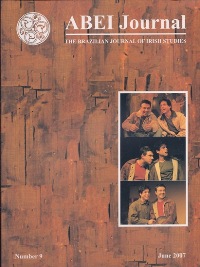Performances and the String Quartet n. 2 – Intimate Letters
DOI:
https://doi.org/10.37389/abei.v9i0.3695Palavras-chave:
Quartet, Brian Friel, Translations, Drama.Resumo
Speculatively probing the twilight of Czech composer Leos Janacek’s (1854-1928) life and career, an enthusiastic PhD student, Anezka Ungrova, crossexamines the dead Janacek – the subject of her thesis. The setting for the play is the present day when Ungrova is interviewing the deceased Janacek for her doctoral dissertation. She is intrigued by the passions of word and music embodied in this story. Of particular interest to Ungrova are the 700 passionate love letters the composer wrote to Kamila Stosslova over the last 11 years of his
life and to what extent this relationship influenced and inspired his later quartets, mainly Quartet No. 2 which the composer called Intimate Letters. Janacek wrote his String Quartet No. 2 over a period of three weeks in January-February 1928. He was then in his 74th year. He died the following August. While he was composing Intimate Letters, every day he wrote extravagant, passionate, at times barely coherent love-letters to Kamila Stosslova, a married woman 37 years his junior. Performances, Friel’s latest play, looks at Janacek’s frantic life during
those intoxicated weeks, and specifically at his obsession with Kamila and the manifestation of that passion in the themes of the Quartet. Punctuated only by the intrusion by a string quartet, Ungrova’s relentless questioning of Janacek gradually assumes a shrink/patient relationship and is elevated above the tedium of mere biographical inquiry. This device allows Friel to expertly portray the broader themes of human longing and love, and their subsequent manifestations in art and music. Friel also explores the issue about the way that we tend to prefer the artist to his art and look to the life rather than the work. Musical constructions abound in the work of Friel and it is not unusual to find
him structuring sections of his drama after musical forms. This paper sustains that unlike other plays by Friel such as Translations and Philadelphia Here I Come! which can be considered strong political plays, Performances can be remembered as an impulse to combine theatre and music. However, according to critics, Friel “has written this piece with a carefree, almost reckless and disdainful attitude towards popular acclaim” which may disappoint theatregoers who attend on the strength of his previous hit outings, such as Dancing at Lughnasa, Living Quarters or Philadelphia, Here I Come.
Referências
Corbett, Tony. Brian Friel: Decoding the Language of the Tribe. Dublin: The Liffey Press, 2002.
Friel, Brian. Performances. County Meath, Ireland: The Gallery Press 2003.
Morse, Donald E., Bertha Csilla, and Kurdi, Mária, eds. “Brian Friel’s Dramatic Artistry ‘The Work Has Value’”. Carysfort Press.
Self Portrait. AQUARIUS, 5, 1972, pp. 17-22 in Thomas Joseph Marie van Dijck PhD thesis: “Permanência e Variedade em Brian Friel: Uma Travessia Técnica.” Universidade de São Paulo,


